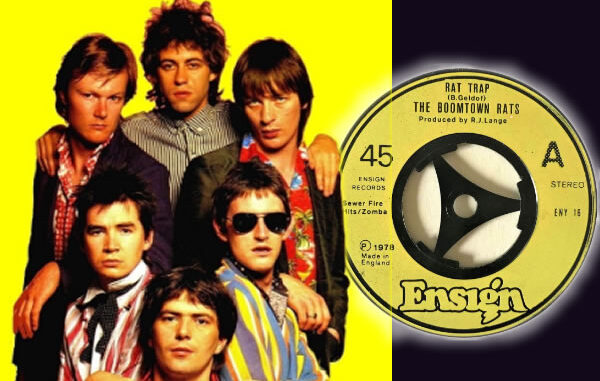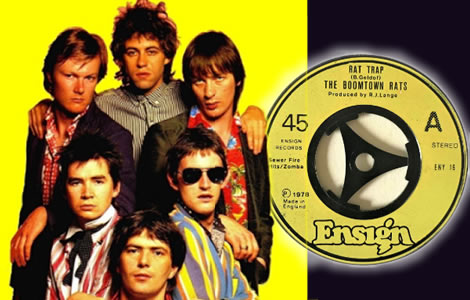
The Boomtown Rats, an Irish rock band formed in Dublin in 1975, skyrocketed to fame with their groundbreaking hit “Rat Trap.” This song, which became their first No. 1 single in the UK in 1978, marked a significant milestone in their career and helped cement their place in the rock music scene.

To fully appreciate the impact of “Rat Trap,” it’s essential to explore the band’s history, the backgrounds of its members, and the trajectory of their frontman, Bob Geldof.
Formation and Early Years
The Boomtown Rats were formed by six friends from Dún Laoghaire, Dublin: Bob Geldof (vocals), Pete Briquette (bass), Garry Roberts (guitar), Gerry Cott (guitar), Johnnie Fingers (keyboards), and Simon Crowe (drums).
The band drew inspiration from the burgeoning punk rock movement and new wave music, blending these influences to create a distinctive sound characterized by high energy and pointed social commentary.
Their early work was marked by a raw, punk-influenced sound. The band’s debut single, “Lookin’ After No. 1,” released in 1977, was a hit in the UK and set the stage for their future success. Their first album, “The Boomtown Rats,” followed the same year, garnering positive reviews and helping to build their reputation.
The Rise of “Rat Trap”
In 1978, The Boomtown Rats released their second album, “A Tonic for the Troops,” which included the standout track “Rat Trap.” Written by Bob Geldof, the song was a gritty, narrative-driven piece that diverged from their earlier punk style, featuring a more sophisticated arrangement and storytelling approach.
The song tells the story of Billy, a young man feeling trapped by his circumstances in a dead-end town, longing for escape and a better life.
“Rat Trap” was released as a single in October 1978 and quickly gained traction. It resonated with audiences for its relatable themes of frustration and disillusionment, capturing the zeitgeist of the late 1970s.
The song’s success was bolstered by the band’s dynamic live performances and their growing reputation for delivering socially conscious music.
Success and Impact
“Rat Trap” reached No. 1 on the UK Singles Chart in November 1978, making The Boomtown Rats the first Irish band to achieve this feat.
The song’s success was a pivotal moment for the band, propelling them into the mainstream and establishing them as significant players in the rock music scene.
It also marked a departure from the prevailing disco sound that dominated the charts at the time, signaling a resurgence of rock and punk influences.
The success of “Rat Trap” had a profound impact on the band’s career. It paved the way for future hits and helped them secure a place in the annals of rock history.
The song’s narrative style and thematic depth also set a precedent for their subsequent work, showcasing their ability to blend music with meaningful storytelling.
Bob Geldof’s Later Career and Exploits
Bob Geldof, the charismatic frontman of The Boomtown Rats, leveraged the band’s success to become a prominent activist and humanitarian. In 1984, deeply moved by the famine in Ethiopia, Geldof co-wrote the charity single “Do They Know It’s Christmas?” with Midge Ure. The song, performed by a supergroup of artists known as Band Aid, became one of the best-selling singles of all time and raised millions for famine relief.
Geldof’s activism did not stop there. In 1985, he organized Live Aid, a global benefit concert held simultaneously in London and Philadelphia, which featured performances by some of the biggest names in music. Live Aid raised over $125 million for famine relief and is regarded as one of the most significant humanitarian efforts in music history. For his efforts, Geldof was knighted in 1986.
Beyond his humanitarian work, Geldof continued to be involved in music and media. He pursued a solo career, releasing several albums, and remained a vocal advocate for various social and political causes. His autobiography, “Is That It?” published in 1986, provides an in-depth look at his life, career, and activism.
The Boomtown Rats’ Legacy
While “Rat Trap” remains one of the band’s most iconic songs, The Boomtown Rats continued to produce music throughout the early 1980s.
They released several more albums, including “The Fine Art of Surfacing” (1979), which featured another major hit, “I Don’t Like Mondays.” However, none of their subsequent releases matched the groundbreaking impact of “Rat Trap.”
The band eventually disbanded in 1986, with its members pursuing various solo projects and careers. Despite this, The Boomtown Rats occasionally reunited for tours and new recordings, maintaining a loyal fan base.
Their music, characterised by its blend of punk energy and social commentary, continues to resonate with audiences today.
“Rat Trap” stands as a testament to The Boomtown Rats’ ability to channel the frustrations and aspirations of a generation into a powerful, evocative song.
The song’s enduring popularity underscores the band’s impact on the rock music landscape and their role in addressing societal issues through their art. For Bob Geldof, the success of “Rat Trap” was a stepping stone to a life of activism and humanitarian work, making a lasting difference in the world beyond the music industry.
